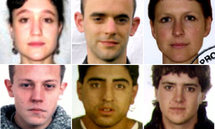
Several witnesses also told police they saw a suspected female member of ETA near the police barracks on the island where a car bombing killed two policeman on July 30, El Mundo daily reported.
A photo of Itziar Moreno was widely distributed by the interior ministry after that attack, along with that of five other suspected members of the armed Basque separatist group.
Police were sifting through the debris from Sunday's blasts to determine if the timers used could have allowed the bombs to be planted days in advance, giving the bombers time to leave the island undetected.
"We have to work on both hypotheses -- that they are still here and that they may have quit the island," regional interior ministry delegate Ramon Socias told the news radio station Cadena SER.
The explosions which rocked Majorca on Sunday, causing some damage but no injuries, followed a warning call made from France to a Basque taxi company in the name of ETA.
The group issued a statement overnight Saturday in which it claimed responsibility for the July 30 Majorca bombing that killed the two police officers. No warning was made before that attack.
Spanish media said police believe a fourth bomb may have caused an explosion on Sunday at an empty restaurant in Palma, a blast firefighters had initially blamed on a gas leak.
Officials believe the bombings were aimed at hurting Spain's key tourist industry, which is already suffering from a slump in visitors due to the global economic downturn, at the height of the summer holiday season.
"It's early to draw conclusions from the situation but based on the information we have gathered ... the terrorist attacks have not changed the holiday plans of tourists," secretary of state for tourism Joan Mesquida said.
"ETA has been looking to hit tourism in Spain for 30 years and tourism always emerges stronger from it."
The head of the Spanish Federation of Travel Agents, Jesus Martinez Millan, said that the July 30 attack led to just "25 to 30 cancellations" in Majorca.
"When a country is perceived as safe, which (Spain) in fact is, an incident of this kind cannot do any harm," he told the Europa Press news agency.
"If (ETA) has tried to harm the tourist industry, it has backfired."
Spain's King Juan Carlos and his wife Queen Sofia continued their annual holiday at their summer residence in Majorca despite the attacks.
In August 1995, Juan Carlos was the target of an assassination attempt while on holiday on the island.
Tourism accounts for 80 percent of the economy of the Balearic Islands, which group Majorca, Menorca, Ibiza and Formentera.
In 2008, they welcomed 10 million tourists, including four million Germans and 3.4 million Britons.
Founded half a century ago, ETA is blamed for the deaths of 828 people in its violent campaign for an independent Basque homeland encompassing parts of northern Spain and southwest France.
It is considered a terrorist organisation by the European Union and the United States.
--------------------------------------------------------------------------------------------------------------------
A photo of Itziar Moreno was widely distributed by the interior ministry after that attack, along with that of five other suspected members of the armed Basque separatist group.
Police were sifting through the debris from Sunday's blasts to determine if the timers used could have allowed the bombs to be planted days in advance, giving the bombers time to leave the island undetected.
"We have to work on both hypotheses -- that they are still here and that they may have quit the island," regional interior ministry delegate Ramon Socias told the news radio station Cadena SER.
The explosions which rocked Majorca on Sunday, causing some damage but no injuries, followed a warning call made from France to a Basque taxi company in the name of ETA.
The group issued a statement overnight Saturday in which it claimed responsibility for the July 30 Majorca bombing that killed the two police officers. No warning was made before that attack.
Spanish media said police believe a fourth bomb may have caused an explosion on Sunday at an empty restaurant in Palma, a blast firefighters had initially blamed on a gas leak.
Officials believe the bombings were aimed at hurting Spain's key tourist industry, which is already suffering from a slump in visitors due to the global economic downturn, at the height of the summer holiday season.
"It's early to draw conclusions from the situation but based on the information we have gathered ... the terrorist attacks have not changed the holiday plans of tourists," secretary of state for tourism Joan Mesquida said.
"ETA has been looking to hit tourism in Spain for 30 years and tourism always emerges stronger from it."
The head of the Spanish Federation of Travel Agents, Jesus Martinez Millan, said that the July 30 attack led to just "25 to 30 cancellations" in Majorca.
"When a country is perceived as safe, which (Spain) in fact is, an incident of this kind cannot do any harm," he told the Europa Press news agency.
"If (ETA) has tried to harm the tourist industry, it has backfired."
Spain's King Juan Carlos and his wife Queen Sofia continued their annual holiday at their summer residence in Majorca despite the attacks.
In August 1995, Juan Carlos was the target of an assassination attempt while on holiday on the island.
Tourism accounts for 80 percent of the economy of the Balearic Islands, which group Majorca, Menorca, Ibiza and Formentera.
In 2008, they welcomed 10 million tourists, including four million Germans and 3.4 million Britons.
Founded half a century ago, ETA is blamed for the deaths of 828 people in its violent campaign for an independent Basque homeland encompassing parts of northern Spain and southwest France.
It is considered a terrorist organisation by the European Union and the United States.
--------------------------------------------------------------------------------------------------------------------









 Home
Home Politics
Politics









